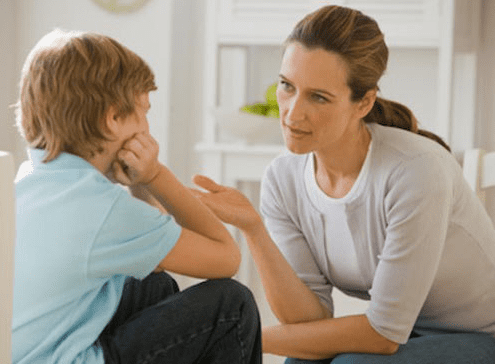I was standing at the kitchen sink crying. I had just screamed at my 7 year old again. Albeit he was being really annoying, and he talked back to me for the umpteenth time, but it was no reason to scream at him. I just couldnt control my anger. I was in that agitated, almost-manic state. As soon as I yelled, he got very quiet and I started crying. So he came over to me, patted my leg and hugged me. Its ok, Mommy. Ill be better for you.
It wasnt the first time that I wondered if I was fit to be a parent. It also wasnt the first time I was in awe of how blessed I am to have the son I do.
When he was younger and I would get upset, he would ask my husband, Daddy, what did you do to make Mommy sad? In his mind, it must have been Daddys fault because HE didnt do anything. I tired to tell him that it was nobodys fault sometimes Mommy just feels sad. The answer never quite satisfied him. He would just say ok and pat my back until I stopped crying.
So, the question became what is the best way to help him understand bipolar disorder? It is a complicated illness that many grown ups are afraid of mostly because they dont understand it. My husband and I went on a search for resources that would help us educate our son.
One of the best things we found was a book, The Bipolar Bear Family: When a Parent Has Bipolar Disorder, by Angela Holloway. In this story, Mama Polar Bear has bipolar disorder and goes to the doctor and adopts healthy behaviors to try to be as stable as possible. Shes not perfect, but is better than when she was not taking care of herself.
When I yell or cry, my son asks, Are the polar bears in your head acting up again? Not quite an accurate synopsis of the book, but still the answer is usually, Yes. This elucidation helps him understand that it is not an external force causing me to be angry or depressed its not his fault or Dadas fault. It just is.
His general understanding of bipolar disorder is not an excuse for me to let myself go. I am learning to control my outbursts with therapy and mindful meditation, taking my medications and checking in regularly with my doctor, and trying to be more healthful in general. But I, like so many of us, am far from perfect. But the fact that he understands is one step closer to feeling like a semi-competent parent. We work together as a team to make each other stronger and that helps all of us a lot!
Read the rest of Beka’s posts for IBPF here.


